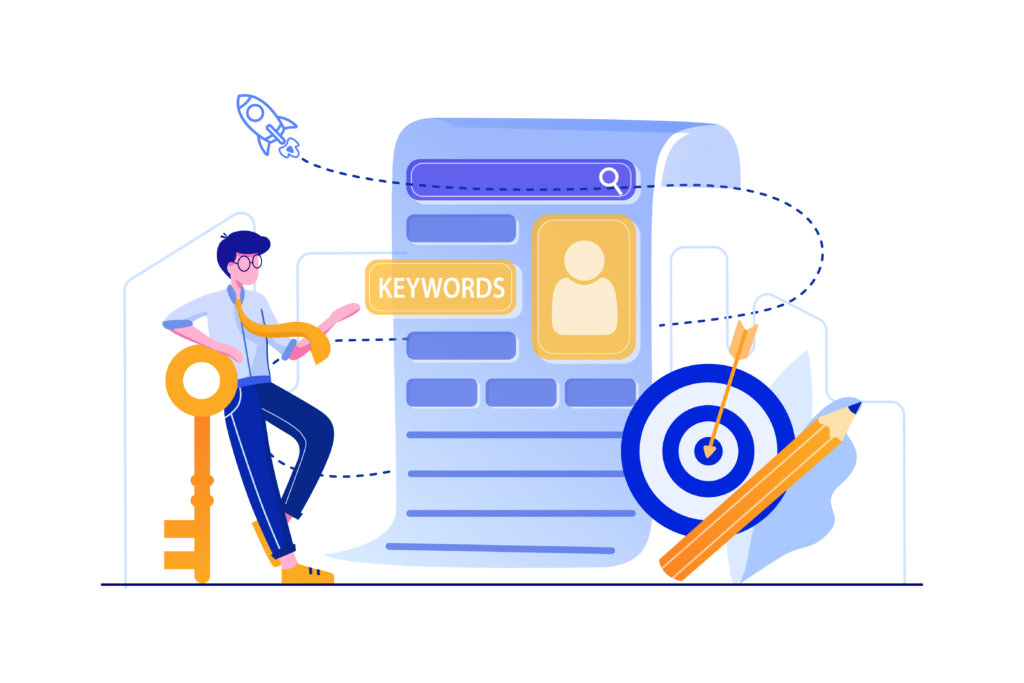Avoiding common ecommerce SEO mistakes is pivotal for enhancing your online store’s visibility and profitability. Effective ecommerce SEO can mean the difference between languishing in obscurity or dominating search engine results, driving unparalleled traffic and revenue. However, navigating the intricacies of ecommerce SEO isn’t without its pitfalls. Common ecommerce SEO mistakes can stealthily sabotage your efforts, diminishing your site’s visibility and hindering potential growth.
This article is your essential roadmap to identifying and rectifying these critical mistakes. By implementing the insights shared here, you’ll fortify your ecommerce SEO strategy, ensuring sustained growth and success in the digital marketplace.
- Ecommerce SEO Mistake #1: Keyword Research Mistakes
- Ecommerce SEO Mistake #2: On-Page Optimization Errors
- Ecommerce SEO Mistake #3: Technical SEO Issues
- Ecommerce SEO Mistake #4: Content Quality and Structure
- Ecommerce SEO Mistake #5: Backlinking Pitfalls
- Unlock Your Ecommerce Potential: Partner with Flying V Group to Avoid Common Ecommerce SEO Mistakes
- FAQs
- What are common ecommerce SEO mistakes to avoid?
- How do ecommerce SEO mistakes impact my online store’s performance?
- What are the signs that my ecommerce site is making SEO mistakes?
- Can fixing ecommerce SEO mistakes improve my site’s rankings quickly?
- How can a professional agency help in correcting ecommerce SEO mistakes?
Ecommerce SEO Mistake #1: Keyword Research Mistakes
Effective keyword research is the cornerstone of successful ecommerce SEO, yet many businesses falter due to common mistakes. In the pursuit of high rankings, overlooking or mishandling keyword strategies can lead to missed opportunities and decreased visibility in search engine results.
1. Neglecting Long-Tail Keywords:
- Issue: Focusing solely on broad, competitive keywords.
- Solution: Prioritize long-tail keywords that capture specific customer intents and have lower competition, enhancing your chances of ranking
2. Ignoring Seasonal Trends:
- Issue: Failing to capitalize on seasonal or trending keywords relevant to your products.
- Solution: Use tools like Google Trends to identify and integrate seasonal keywords into your content strategy.
3. Overlooking Competitor Analysis:
- Issue: Not researching competitor keywords and strategies.
- Solution: Conduct thorough competitor analysis to identify gaps and opportunities in keyword targeting.
4. Relying Solely on Broad Match Keywords:
- Issue: Using broad match keywords without considering variations or semantic relevance.
- Solution: Utilize tools like Semrush or Ahrefs to explore related keywords and semantic variations that can broaden your reach.
5. Lack of Keyword Intent Understanding:
- Issue: Failing to align keywords with user intent (e.g., informational, transactional).
- Solution: Analyze search intent behind keywords and tailor your content to match user expectations, improving engagement and conversions.

Ecommerce SEO Mistake #2: On-Page Optimization Errors
Effective on-page optimization is essential for maximizing visibility and attracting organic traffic to your ecommerce website. However, overlooking critical on-page SEO factors can hinder your site’s performance in search engine rankings and user engagement.
- Poorly Optimized Meta Tags:
- Issue: Inadequate or duplicate meta titles and descriptions.
- Solution: Craft unique meta tags for each page, incorporating relevant keywords and compelling calls-to-action.
- Thin or Duplicate Content:
- Issue: Product descriptions or category pages lacking unique, valuable content.
- Solution: Ensure each page offers substantial, original content that informs and engages visitors while integrating relevant keywords naturally.
- Neglecting Image Optimization:
- Issue: Large file sizes, missing alt text, or improper naming conventions for images.
- Solution: Optimize images by reducing file sizes, using descriptive alt text with keywords, and following best practices for image SEO.
- Slow Page Loading Speed:
- Issue: Pages that load slowly due to heavy images, excessive scripts, or server issues.
- Solution: Improve page speed by optimizing images, leveraging browser caching, and considering a Content Delivery Network (CDN) for faster delivery.
- Lack of Internal Linking Structure:
- Issue: Sparse or disorganized internal linking across pages.
- Solution: Establish a coherent internal linking strategy to guide visitors and search engines through relevant content, boosting SEO and user navigation.

Ecommerce SEO Mistake #3: Technical SEO Issues
Effective technical SEO forms the backbone of a well-optimized ecommerce website, influencing its crawlability, indexability, and overall performance in search engine results. Addressing these foundational elements is crucial for ensuring your site is accessible to search engines and provides a seamless user experience.
- Mobile Optimization:
- Issue: Lack of responsive design or mobile-friendly usability.
- Solution: Implement responsive web design and ensure mobile compatibility to cater to the increasing number of mobile users.
- Site Speed and Performance:
- Issue: Slow loading times due to heavy images, excessive scripts, or server issues.
- Solution: Optimize images, leverage browser caching, and consider using a Content Delivery Network (CDN) for faster page loading speeds.
- URL Structure and Site Architecture:
- Issue: Complex or unclear URL structures that hinder user navigation and search engine crawling.
- Solution: Simplify URL structures, use descriptive URLs with keywords, and organize site architecture to enhance usability and SEO.
- Schema Markup:
- Issue: Missing schema markup that enhances search engine understanding of your ecommerce site’s content.
- Solution: Implement schema markup for products, reviews, and other relevant data to improve visibility in search results and attract qualified traffic.

Ecommerce SEO Mistake #4: Content Quality and Structure
Compelling content is not only vital for engaging your audience but also plays a crucial role in enhancing your ecommerce site’s SEO performance. Ecommerce sites face unique challenges in content creation, requiring strategies that blend informative, persuasive, and SEO-friendly elements to attract and retain customers.
- Unique Product Descriptions:
- Issue: Using manufacturer-provided descriptions that are duplicated across multiple sites.
- Solution: Craft unique, detailed product descriptions that highlight features, benefits, and unique selling points, incorporating relevant keywords naturally.
- User-Generated Content and Reviews:
- Issue: Underutilizing user-generated content and customer reviews.
- Solution: Encourage customer reviews and testimonials to enhance credibility and SEO, leveraging user-generated content for SEO benefits.
- Structuring Content for SEO and Usability:
- Issue: Lack of clear structure in content that hinders readability and SEO.
- Solution: Use headings, subheadings, bullet points, and internal links to organize content effectively, improving both user experience and search engine visibility.
- Optimizing Blog Posts and Guides:
- Issue: Publishing blog posts or guides without optimizing them for relevant keywords or search intent.
- Solution: Conduct keyword research and optimize blog posts with valuable content that addresses customer pain points, guiding them towards making informed purchase decisions.
Ecommerce SEO Mistake #5: Backlinking Pitfalls
Building a robust backlink profile is essential for ecommerce SEO success, yet many businesses struggle with common pitfalls that can hinder their efforts. Effective backlinking strategies not only improve search engine rankings but also enhance your ecommerce site’s authority and credibility.
- Low-Quality Backlinks:
- Issue: Acquiring backlinks from spammy or irrelevant websites.
- Solution: Focus on acquiring links from authoritative sites within your industry niche, ensuring relevance and quality.
- Lack of Diversification:
- Issue: Over-reliance on a single type of backlink (e.g., guest posts) without diversifying sources.
- Solution: Diversify your backlink sources, including guest blogging, influencer collaborations, product reviews, and local citations.
- Ignoring Anchor Text Diversity:
- Issue: Using overly optimized or repetitive anchor texts that appear unnatural.
- Solution: Use diverse anchor texts, including branded, naked URLs, and long-tail keywords, to maintain a natural link profile.
- Neglecting Link Quality Over Quantity:
- Issue: Pursuing a high volume of backlinks without assessing their quality.
- Solution: Prioritize quality over quantity by focusing on acquiring links from reputable, high-authority websites.
Unlock Your Ecommerce Potential: Partner with Flying V Group to Avoid Common Ecommerce SEO Mistakes
At Flying V Group, we understand the intricacies of ecommerce SEO and the critical errors that can hinder your online success. By addressing these ecommerce SEO mistakes head-on, we empower your business to rise above the competition. Our tailored strategies encompass comprehensive keyword research, meticulous on-page optimization, and strategic backlinking to maximize your site’s visibility and drive organic traffic.
With a proven track record of delivering results for diverse ecommerce clients, Flying V Group is your trusted partner in achieving sustained growth and profitability. Contact us today and let’s elevate your ecommerce SEO to new heights.
FAQs
What are common ecommerce SEO mistakes to avoid?
Common mistakes include neglecting keyword research, poor on-page optimization, slow site speed, lack of mobile optimization, and insufficient backlinking strategies. Addressing these can significantly improve your site’s SEO performance.
How do ecommerce SEO mistakes impact my online store’s performance?
SEO mistakes can lead to decreased visibility in search engine results, reduced organic traffic, lower conversion rates, and ultimately, hindered growth and profitability for your ecommerce business.
What are the signs that my ecommerce site is making SEO mistakes?
Signs include stagnant or declining traffic, poor keyword rankings, high bounce rates, low engagement metrics, and lack of visibility for target keywords in search engine results pages (SERPs).
Can fixing ecommerce SEO mistakes improve my site’s rankings quickly?
While fixing SEO mistakes can lead to improvements, significant ranking changes often require ongoing optimization efforts, consistent content updates, and adapting to search engine algorithm updates over time.
How can a professional agency help in correcting ecommerce SEO mistakes?
Professional agencies like Flying V Group provide expertise in diagnosing and addressing specific SEO issues tailored to ecommerce sites. They implement strategic solutions to improve site performance, enhance visibility, and drive organic traffic and conversions.






0 Comments